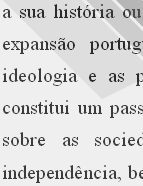

................................
Between 1950 and 1974, Portuguese studies displayed a strong dependence on the theoretical crutch of "assimilation", while never ceasing to be impregnated by the theories of Lusotropicalism, to which the state, society and intellectuals adhered almost blindly. "Several Portuguese scientists (...) have (…) been refocusing their research on different specialties around the relations of the Lusitanian people with the tropics, under the Luso-tropical criterion", claimed Gilberto Freyre in the work entitled O Luso e o Trópico [The Lusitanian and the Tropics] (1961, 2), published after the Congresso Internacional de História dos Descobrimentos [International Congress of History of the Discoveries], citing the names of Almerindo Lessa in medicine, Marcelo Caetano and Adriano Moreira in law and power management, and not forgetting two major names in Portuguese science: the geographer Orlando Ribeiro, who underlined how colonial scientific research "can and should also serve practical purposes; the better the knowledge one has of a region's Natural History, the firmer the delineation of its economic development will be" (Problemas da Investigação Científica Colonial [Problems of Colonial Scientific Research], 1950, 11), and the anthropologist Jorge Dias, summoned to direct the Missão de Estudos das Minorias Étnicas do Ultramar Português [Mission for the Studies of Ethnic Minorities of the Portuguese Overseas Territories], who stated, in 1956, that "the so-called Portuguese overseas expansion is (...) highly transcendent for the history of humanity.
Portuguese actions cannot be confused with the colonising movements of the capitalist nations, which established a type of human relation based on racial differentiation" (Ensaios Etnológicos [Ethnological Essays], 1961, 153). Jorge Dias came to realise not the rigour of the theory but the truths that resulted from his fieldwork, highlighting in a confidential document [1957] that "contrary to what people think, and what I also thought, negroes, today (.... ) fear us, many detest us, and when they compare us with other white men it is always in a way that is unfavourable to us", adding that the Portuguese "have got so used to considering themselves superior beings that they do not notice anything (...) nor do they show the slightest gesture of courtesy when speaking with educated or assimilated negroes (...). Thus, an unnecessary abyss (...) is being created between negroes and whites, which seems contrary to the superior directives established by those in charge" (Pereira, "Antropologia aplicada na política colonial portuguesa do Estado Novo" [“Applied anthropology in the Portuguese colonial policy of the Estado Novo”], 1986, 223-225).
